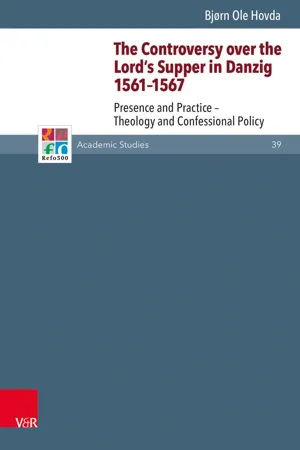
The Controversy over the Lord's Supper in Danzig 1561–1567
Presence and Practice – Theology and Confessional Policy
- 317 pages
- English
- PDF
- Available on iOS & Android
The Controversy over the Lord's Supper in Danzig 1561–1567
Presence and Practice – Theology and Confessional Policy
About this book
In 1561, a Eucharistic controversy erupted in Danzig of the sixteenth century, sparked by disagreements on the real presence and the practical treatment of the Eucharistic elements. It was one of many inner-Lutheran struggles over the Lord's Supper in the years following the Reformation and therefore Björn Ole Hovda supplements the scientific studies on that topic. Different understandings of the presence of Christ during the Lord's Supper formed different religious norms of practice. On the one hand, the controversy is here analyzed as a discussion on doctrine between opposing ecclesiastical factions, set in the context of reformatory theology and liturgical practice. The theological discussions had important practical and cultic implications. One the other hand – and in contrast with the most of earlier works – the study seeks to treat with equal seriousness the wider societal and political aspects of the controversy. Hovda shows how deeply embedded the Eucharist was within broader discourses of culture, society and politics. Far from being just an abstruse ecclesiastical matter, it was a question of great sociopolitical interest and potency. The Eucharist served both as the prime symbol of Christian unity, as well as a confessional border stone between rivaling groups.Other important aspects of this wider analysis are tensions between the ordained ministry and the city council regarding authority, internal social tensions within the city, as well as the strategic interests of the city in its relations to the Polish crown, the Hanseatic league and the emerging new trading powers, among others.Through a close study of one particular controversy, light is cast on a variety of issues with relevance to the broader field of Reformation studies, especially concerning the centrality of the Eucharist.
Frequently asked questions
- Essential is ideal for learners and professionals who enjoy exploring a wide range of subjects. Access the Essential Library with 800,000+ trusted titles and best-sellers across business, personal growth, and the humanities. Includes unlimited reading time and Standard Read Aloud voice.
- Complete: Perfect for advanced learners and researchers needing full, unrestricted access. Unlock 1.4M+ books across hundreds of subjects, including academic and specialized titles. The Complete Plan also includes advanced features like Premium Read Aloud and Research Assistant.
Please note we cannot support devices running on iOS 13 and Android 7 or earlier. Learn more about using the app.
Information
Table of contents
- Title Page
- Copyright
- Preface
- Body
- 1. Introduction
- 2. The Sources in Light of the Ecclesiastical Context
- 3. The Sacrament of the Altar in a City Context
- 4. The Controversy and the Development of Lutheranism
- 5. Conclusion
- 6. Excursus: The Black Rubric
- Abbreviations
- Bibliography
- Index of Subjects
- Index of Persons